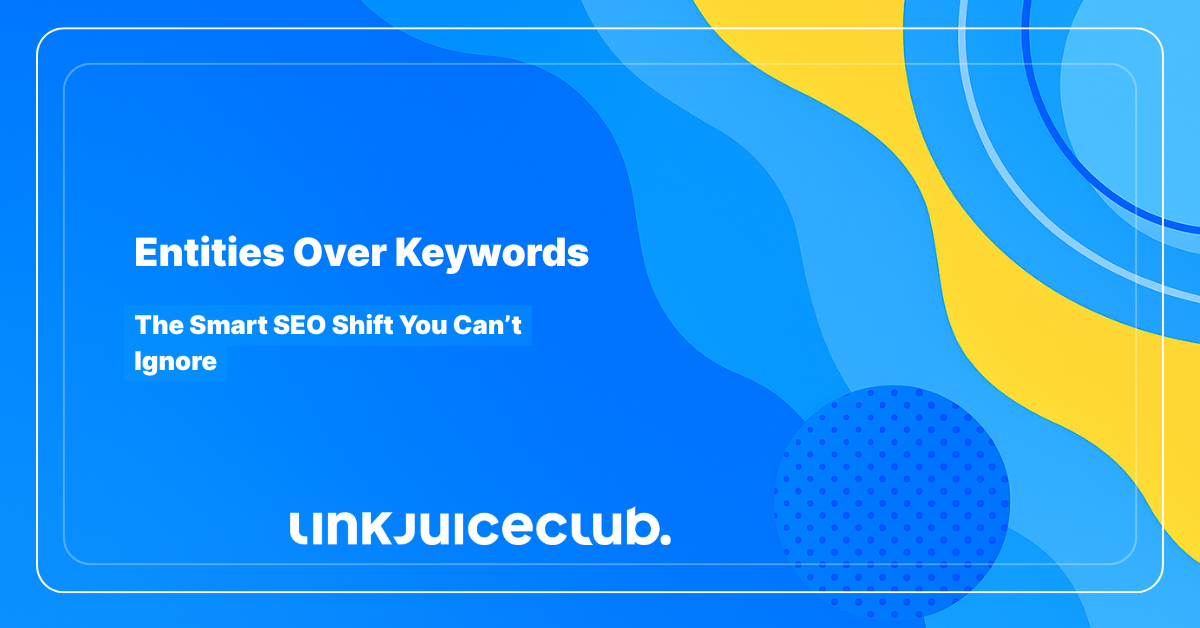
Entities Over Keywords: The Smart SEO Shift You Can’t Ignore
Forget keywords. If you’re not speaking in entities, you’re whispering in a world of AI that only listens to clarity and context.
Search engines today don’t just read — they understand. They see the web like a vast map of meaning, not a bucket of broken phrases. And if you want to win in this game, you’ve got to speak the language of topics, not just terms.
Before we dive into the real magic behind semantic SEO, let’s crack open how modern PageRank actually thinks.

PageRank Grew Up — And It Got Smarter
Once upon a search engine, PageRank simply followed links like breadcrumbs. If a page had more links, it must’ve been important — or so we thought.
But that story changed in 2012 when Google introduced Topic-Sensitive PageRank, a brainchild of software engineer Taher Haveliwala. This wasn’t just a tweak. It was a shift.
Instead of treating all backlinks as equal, Google started listening for relevance. Links between pages covering similar entities and ideas started weighing more — a subtle nod toward topical authority.
📌 Translation? A backlink from a health blog to a meditation article means more than a random one from a dog grooming site. Context is currency.
Goodbye Keywords, Hello Meaning
Old-school SEO was all about stuffing the right phrases. But Google no longer cares just about what you say — it’s about what you mean.
If you’re still chasing exact-match keywords, you’re missing the real treasure. The web has evolved from strings to things, and entities are the building blocks of understanding.
💡 Think about a topic like sustainable fashion. When Google crawls pages on this topic, it’s not just looking for the word “fashion.” It expects to find:
- 🌿 “carbon footprint”
- 👖 “organic cotton”
- 🧵 “supply chain ethics”
These aren’t synonyms — they’re semantic neighbors.
And they tell Google: “Hey, this content actually knows the subject.”
Why This Shift Matters for Your Content Strategy
Creating a truly comprehensive page today means going beyond keywords and tapping into the entire entity ecosystem around your topic.
🔍 Instead of:
Writing a piece on “coffee” and mentioning espresso 15 times…
✅ Try this:
Build a resource that dives into caffeine metabolism, brewing methods, fair trade sourcing, and the cultural rituals tied to coffee consumption.
That’s semantic alignment. That’s what modern PageRank is rewarding.
What Entity SEO Really Means — And Why It’s Your Secret Weapon
Search engines no longer just read text — they decode it. Thanks to AI and machine learning, they’ve made the leap from recognizing keywords to recognizing entities.
So what’s the difference? Keywords are clues. Entities are answers.
Today’s algorithms crave clarity. They want to understand what your page is truly about — not just the surface-level text, but the deep relationships between topics, concepts, and context.
💡 That’s where Entity SEO steps in.
Why Entities Matter in the Age of AI
With tools like Google AI Overviews reshaping search behavior, you’re no longer just writing for users — you’re structuring information for algorithms that think more like humans.
Search engines now expect:
- Content that’s context-rich
- Pages that map clearly to recognized entities
- Structured data that helps them “connect the dots”
If your content doesn’t align with entities, it’s just noise in the SERPs.
So… What Counts as an Entity?
An entity is not just a noun — it’s a known thing. It could be:
- 🧠 A concept: philosophy, mindfulness
- 🌍 A location: London, Mount Everest
- 👤 A person: Nelson Mandela, Ada Lovelace
- 🏢 An organization: NASA, UNICEF
- 🍏 Even a product: iPhone, Red Delicious apple
📌 Notice how “apple” can mean different things. The beauty of entities is that they’re disambiguated — search engines know whether you’re talking about the fruit or the tech giant, based on context.
And that’s the point: If you’re not feeding Google clear signals about which entities your content connects with, you’re missing the opportunity to build relevance — and authority — where it matters.
Think in Entities, Not Just Terms: A Semantic SEO Breakdown
Let’s move beyond keywords and talk about how content becomes recognizable to search engines.
The key? Entities.
Search engines now rely on structured meaning — not vague signals. That’s where semantic SEO enters the game.
Case Study: The Mediterranean Diet
If you’re building a page on the Mediterranean diet, you’re not just targeting a broad term — you’re working with a defined entity.
What makes it an entity?
- It’s a recognized concept with cultural, nutritional, and medical significance
- It exists in structured databases like:
- Wikipedia
- Wikidata
- Google’s Knowledge Graph
- Wikipedia
- It connects to related entities like:
- Olive oil, heart health, anti-inflammatory foods, longevity
- Olive oil, heart health, anti-inflammatory foods, longevity
✅ When your content reflects these relationships, Google sees it as more credible, complete, and contextually aligned.
How to Strengthen Entity Recognition
Use schema markup to help Google understand your page’s focus.
Start with the sameAs property:
json
“sameAs”: [
“https://en.wikipedia.org/wiki/Mediterranean_diet”,
“https://www.wikidata.org/wiki/Q189435”
]
💬 This tells search engines: “This page is directly related to the same entity known across these trusted sources.”
Where to Link with sameAs
Boost semantic weight by linking to:
- Medical studies on the Mediterranean diet
- Official dietary guidelines from health institutions
- Documentaries or public health videos
- Author interviews or cookbooks from known experts
Each connection paints a fuller picture for algorithms to process.
Matching the Right Schema to the Page Type
Depending on your content, apply the appropriate schema:
| Content Type | Schema Recommendation |
| In-depth blog post | BlogPosting or Article |
| Meal plan or diet schedule | Diet or ExercisePlan |
| Health center offering consultations | HealthAndBeautyBusiness |
| Cooking class or workshop event | Event |
| Nutritionist profile | Person |
| Wellness organization | Organization |
| Documentary video or e-book | CreativeWork |
🔍 These help Google accurately categorize and index your page in alignment with real-world entities.
Building a Knowledge Graph with RDF Triples
When you’re crafting a schema markup strategy across your site, you’re not just adding metadata — you’re connecting the dots between entities.
At the heart of this is the RDF Triple — a simple but powerful framework made up of:
- Subject
- Predicate
- Object
Search engines use this structure to understand relationships between concepts — not just what’s mentioned, but how everything is linked.
Let’s Give It a Real Example
Let’s say you’re building out a hub of content around the Mediterranean diet we mentioned above. While exploring its semantic landscape, you find a notable expert: Dr. Ancel Keys — a pioneering researcher who helped define the diet’s global relevance.
Here’s how that looks in RDF form:
| Role | Entity / Concept |
| Subject | Dr. Ancel Keys |
| Predicate | knowsAbout |
| Object | Mediterranean diet |
Both Dr. Ancel Keys and the Mediterranean diet are recognized entities — and this semantic connection tells search engines that your content reflects real-world, meaningful relationships.
Connecting Entities Across Pages
Let’s say you also have a page fully dedicated to the Mediterranean diet. From the Dr. Ancel Keys page, you can enhance semantic clarity by linking via:
json
“sameAs”: [
“https://en.wikipedia.org/wiki/Mediterranean_diet”,
“https://www.wikidata.org/wiki/Q189435”
]
And vice versa — link from the Mediterranean diet page back to trusted sources or people involved in its history and research.
🎯 This isn’t just internal linking — it’s entity-level mapping that search engines understand and reward.
The Bottom Line: Why Thinking in Entities Changes the SEO Game
We’ve moved beyond matching strings. In today’s search landscape, context is king, and entities are your crown jewels.
By shifting from a keyword-stuffed approach to a semantic, entity-driven strategy, you’re not just optimizing — you’re educating search engines about the true meaning of your content.
And when Google understands your content, it starts to trust it.
Key takeaways for mastering entity SEO with structure and strategy:
- Search engines now prioritize meaning over literal matches — entities help bridge that gap.
- Topic-sensitive PageRank rewards pages that are semantically aligned and context-rich.
- Entity mapping (like the Mediterranean diet and Dr. Ancel Keys) deepens trust and relevance.
- Use schema markup like sameAs, knowsAbout, and tailored types (Article, Person, Event) to strengthen your data structure.
- Building an internal knowledge graph gives your site a framework that Google can navigate — and reward.
📌 This isn’t a trend — it’s the evolution of search. And if you want to win long-term, it’s time to stop writing pages and start building meaningful entities.





